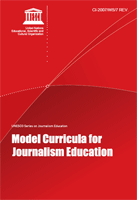Publications
Model curricula for journalism education

The proposed Journalism Curricula is a generic model that can be adapted according to each country’s specific needs. It takes full cognizance of the social, economic, political and cultural contexts of developing countries and emerging democracies, highlighting the connection between democracy and journalism and arguing for a more cross-disciplinary approach within journalism training centres.
In December 2005, in response to numerous requests from Member States for help in the design of journalism education curricula, UNESCO convened an experts’ consultative meeting in Paris. Major outputs of the consultation were the identification of courses, which should be included in a journalism curriculum.
A team of four UNESCO experts, commissioned for the initial development of the journalism education curricula initiative, solicited a response to their first draft from twenty senior journalism educators who were deemed to have considerable experience working in developing countries and emerging democracies. Their responses proved to be essential for the establishment of appropriate and applicable curricula. The revised draft design thus featured a list of courses for both undergraduate and post-graduate levels, a brief description of each course and an outline of fundamental journalism competencies.
Journalism instructors with experience working in developing countries or emerging democracies were then carefully selected from Africa, Asia, Europe, the Middle East, and North and South America to write the syllabuses for seventeen core courses. The draft curricula was reviewed at a second experts’ consultative meeting at UNESCO in Paris, selecting a number of model syllabuses to qualify the document for formal presentation to the World Journalism Education Congress in June 2007 in Singapore.
A team of four UNESCO experts, commissioned for the initial development of the journalism education curricula initiative, solicited a response to their first draft from twenty senior journalism educators who were deemed to have considerable experience working in developing countries and emerging democracies. Their responses proved to be essential for the establishment of appropriate and applicable curricula. The revised draft design thus featured a list of courses for both undergraduate and post-graduate levels, a brief description of each course and an outline of fundamental journalism competencies.
Journalism instructors with experience working in developing countries or emerging democracies were then carefully selected from Africa, Asia, Europe, the Middle East, and North and South America to write the syllabuses for seventeen core courses. The draft curricula was reviewed at a second experts’ consultative meeting at UNESCO in Paris, selecting a number of model syllabuses to qualify the document for formal presentation to the World Journalism Education Congress in June 2007 in Singapore.
 Download Download |
|---|
 Details Details |
|---|




